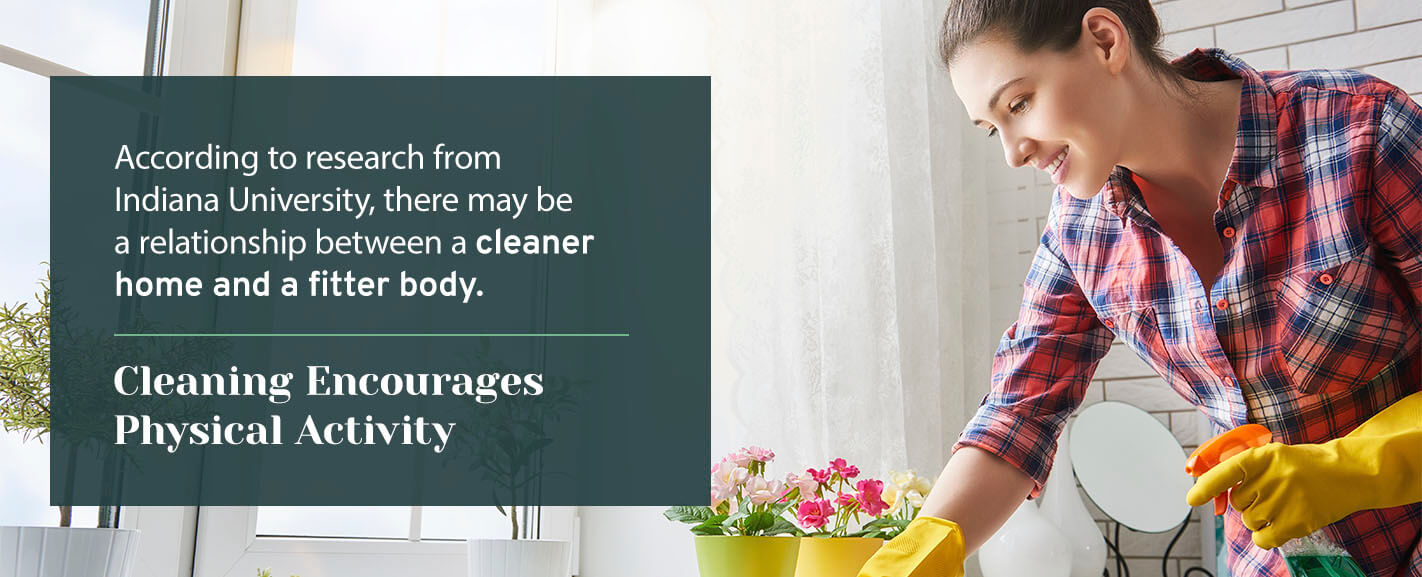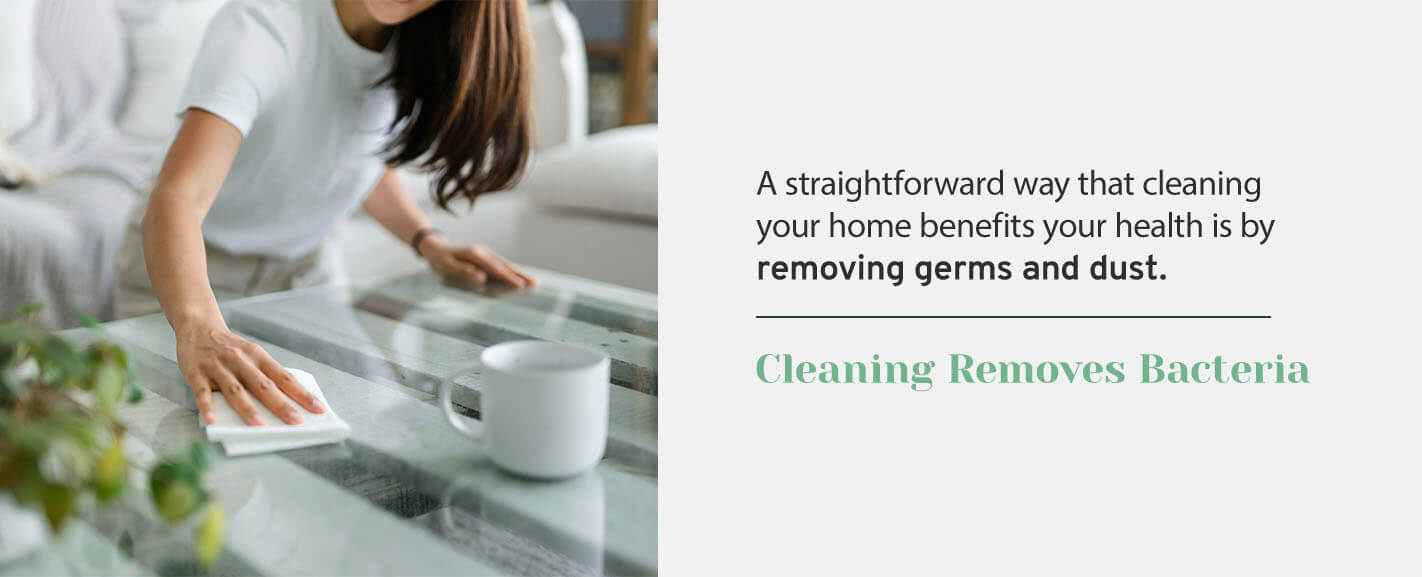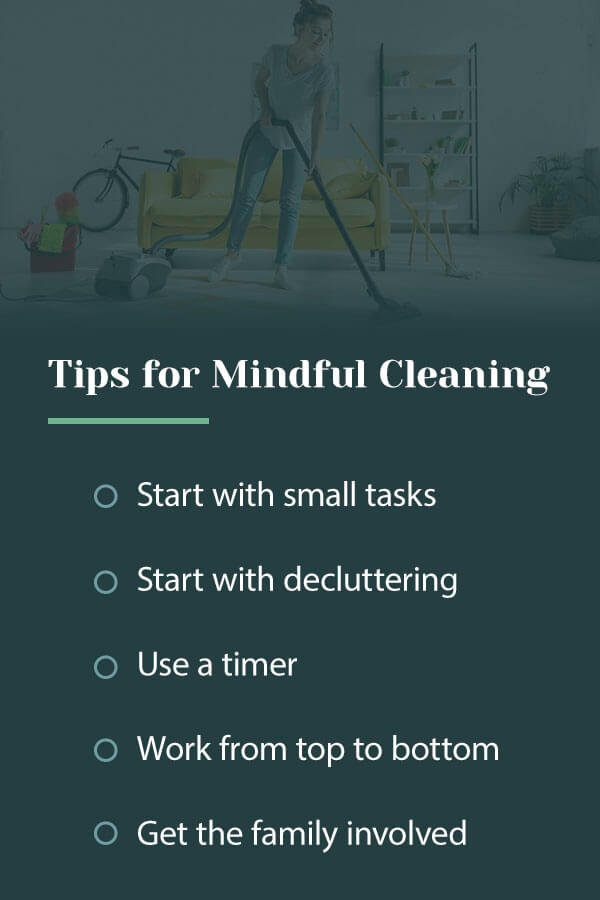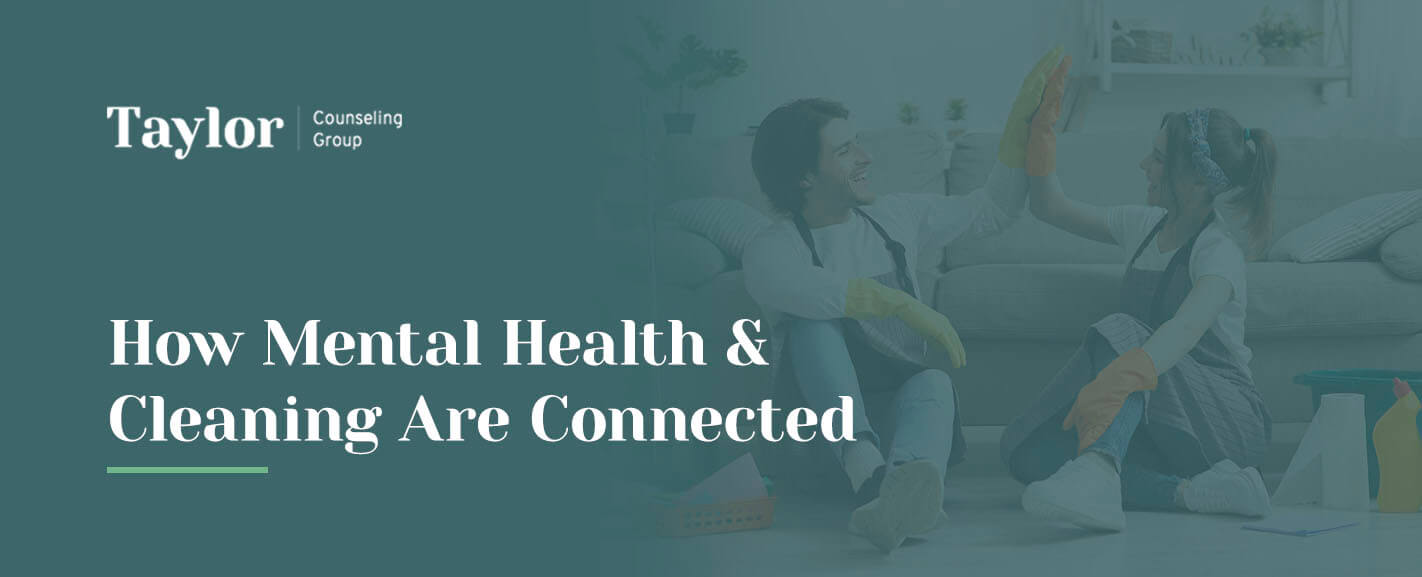In response to negative feelings of stress and frustration, many of us turn to yoga sessions, evening walks or a creative hobby to improve our moods. But there are many other mindful, stress-relieving activities you may not have considered. Even simple tasks like organizing your bedroom, sweeping the hallway or doing the dishes can help you relax and refocus after a long and busy day.
You may have already experienced how cleaning improves your mood and makes you feel healthier — but have you ever wondered why? Doctors, mental health experts and a large body of research support a relationship between cleaning and stress relief, improved mood and overall health. Next time you’re feeling down or overwhelmed, consider cleaning your living space to improve your mental health.
How Does Cleanliness Affect Health?
There are several ways cleanliness affects overall health. You might assume cleaning benefits our health by simply removing local germs and bacteria, but cleaning may also directly improve how your body functions. Studies show that physical movement and stress reduction can both have profound benefits on our health. Cleaning up may help mitigate a wide range of health concerns, including heart disease, high blood pressure, anxiety, depression and sleep problems.

Cleaning Encourages Physical Activity
According to research from Indiana University, there may be a relationship between a cleaner home and a fitter body. Among 998 residents of St. Louis, the interior condition of their homes had a greater effect on their physical activity than any other element, like the availability of sidewalks or street lighting. The researchers note that physical activity can reduce the chance of developing risk factors for cardiovascular disease, as well as reduce the effect of such risk factors when they exist.
The Indiana University researchers suggest something about having a clean home drives physical activity or that people are being physically active while cleaning their homes. Dusting, sweeping, doing laundry and organizing are all forms of light physical activity and may reduce the risk of cardiovascular disease. Exercise can also improve mental health, helping to lower anxiety, decrease depression and improve your mood overall.
Cleaning Reduces Stress
Despite our best efforts, life bombards us with all sorts of stress. Weekday commutes, paying rent, fixing the computer, family drama and more can all add up and impact our mood and health.
When our living spaces are disorganized and cluttered, they can augment our feelings of stress and make it difficult to feel clear-headed and in control. Increased stress means the adrenal glands produce more cortisol, the body’s main stress hormone. Cortisol helps regulate the body’s metabolism and immune response, but long-term activation of the body’s stress-response system may lead to various health issues, including:
- Heart disease, high blood pressure and stroke
- Impaired memory and concentration
- Feelings of anxiety and depression
- Muscle aches and pains
- Digestive problems
- Sleep problems
- Weight gain
Researchers are also concerned with the complex relationship between our bodies’ stress responsiveness and gut microbiome. Some experts suggest that the increased levels of cortisol associated with stress can deplete the beneficial bacteria of the gut, which can surprisingly affect our behavior and mood. This alteration of the gut microbiome may make us more susceptible to anxiety, depression and even feelings of anger.
In a more direct study of the relationship between a clean home and stress, researchers found less cluttered homes have an association with lower cortisol — and therefore lower risk for adverse health outcomes. The study followed 60 dual-income spouses in “stressful” or “restorative” homes, finding that those in more stressful homes had high cortisol levels and increased depressed mood over the course of the day. Subjects in cleaner, more “restorative” homes had lower cortisol and lower depressed mood.
High levels of stress can have many adverse effects on our physical and mental health, but one way to mitigate these effects is to reduce stress in the first place. Cleaning your living space keeps you active, clears your mind and helps you feel optimistic and in control.

Cleaning Removes Bacteria
A straightforward way that cleaning your home benefits your health is by removing germs and dust. Whether you realize it or not, dirty surfaces may harbor potentially harmful viruses and bacteria, including E. coli, salmonella, campylobacter, norovirus and hepatitis A. Some of these bacteria will survive in places like your kitchen for weeks or even months, so be sure to regularly disinfect your kitchen surfaces, especially after handling raw meats. If you have pets, your home may be susceptible to a more diverse range of bacteria.
Does your dirty kitchen discourage you from spending time in it? If so, you may be more inclined to pick microwave meals and takeout over a balanced diet. Cleaning your kitchen surfaces can instead encourage you to cook quality meals at home.
As the cleanliness of your kitchen improves, you might find home cooking more appealing and try to improve your overall diet and well-being. Instead of walking past dirty dishes and empty takeout containers, you’ll find yourself cooking delicious, nutritious meals in a clean kitchen. With nutrition’s impact on mental health, this benefit can help boost your energy and make you feel more positive overall.
Why Does Cleaning Calm Me?
Perhaps you’re already an avid cleaner and know that it benefits your physical and mental health. Instead of hiking or meditation, you love to dust your bookshelves and vacuum the stairs. But do you know how these positive habits do you so much good? Apart from the studies mentioned above, there is extensive documentation of how cleaning and decluttering can have a calming effect on your body and mind.
Clutter Means Confusion
Would you be more productive working in an organized room or in a room full of messy clutter and irrelevant distractions? It’s no surprise that clutter makes it difficult to focus on your tasks. A study by Princeton University researchers suggests your visual cortex may become overwhelmed by extraneous objects, making it hard to complete your work.
For many, clutter in the home represents an incomplete task, and this lack of completeness can cause high levels of tension and irritability. By decluttering your home, you can take responsibility for your environment and make it more relaxing and easier to navigate. A clean, organized environment means you can focus on the most important challenges in your life.
Cleaning Gives You Control
Feeling like your life is out of control or full of uncertainties is sure to produce stress and anxiety. Any form of cleaning can help you take control of your environment and reduce these negative feelings.
Researchers at the University of Connecticut found that in periods of stress, people often turn to repetitive behaviors like cleaning because it helps them feel in control. Repetitive behaviors like cleaning the kitchen can be a healthy strategy for coping with stress. If your mind itches to clean and declutter in times of high stress, you may be looking for order and a sense of control in your life.
Cleaning Can Make You Mindful
Pursuing a state of mindfulness — of being fully aware of what we are thinking, doing and feeling in the present moment — is a powerful way of calming one’s mind. Cleaning activities may offer an opportunity to exercise mindfulness.
A 2014 studyfound that participants who washed the dishes in a mindful state had increase positive emotions, like inspiration, and decreased negative emotions, like nervousness. Mindful dishwashers were also better at estimating how much time they’d spend doing the dishes. The study suggests that mindfulness and its positive mental benefits are available through a broad range of activities.
Cleaning Can Boost Confidence
The simple act of washing your hands can make you happier. A study found that out of 98 participants, the participants who washed their hands after failing a task became more optimistic that they could do it the next time. The researchers also found that those who washed their hands after a difficult decision were more satisfied with their choice than those who didn’t wash their hands. Physically cleansing one’s hands appears to reduce negative feelings of failure and boost optimism and self-confidence.
If you take cleaning to the rest of your home, you can also benefit your mental health. A tidy home will make you more confident, whether you’re welcoming guests or enjoying the space for yourself. You’ll feel accomplished as you enjoy a clean and organized living space, also contributing to a positive self-image and confidence.
Cleaning and Well-Being
The benefits of cleaning your home — whether that means dusting the shelves, doing the laundry, cleaning the dishes or changing your bedsheets — can’t be understated. These activities can improve your bodily health. Cleaning also has an undeniably calming effect on your mind, reducing confusion, boosting focus and confidence and allowing you to cultivate a sense of control and mindfulness.
Cleaning can improve your well-being in unexpected ways, as well. Like any calming task, cleaning gives your mind a break from your daily concerns and an opportunity to wander, possibly into a “eureka!” moment on a challenge you’re facing. If you’re tidying up your bedroom or storage space, you may even find inspiration in a lost keepsake or forgotten hobby. Apart from directly improving our physical health, cleaning can also enrich our emotional lives.
To support your well-being, you might consider adopting a habit of regularly cleaning your living spaces. Your bedroom is a great place to start. With how much time we spend in our bedrooms, they tend to become cluttered and disorganized.
Your bedroom should be a place to retreat, recharge and — most importantly — get a good night of sleep. Sleep deprivation links to numerous chronic health problems — the National Heart, Lung, and Blood Institute (NIH) even considers it a public health concern in the U.S. Organizing your bedroom and putting clean, fresh linens on your bed is crucial to your well-being.

Book Online Our Therapists
Tips for Mindful Cleaning
If you’re not already in the habit of cleaning your home but want to start, you may need some advice to get started. Even those who dislike cleaning activities should consider pursuing a regular cleaning schedule, as the benefits can be profound. Cleaning your home doesn’t need to be a chore — in fact, it’s a great opportunity to engage in a mindful activity. Here are a few tips for getting started:
- Start with small tasks: If cleaning your whole house seems overwhelming, choose one or two smaller tasks to get in the swing of things. You don’t need to achieve a spotless house over the weekend, and you shouldn’t feel more stressed while cleaning than you were to begin with. Sorting through your mail, doing that week’s worth of dishes or organizing your storage are all great ways to develop a positive cleaning habit.
- Start with decluttering: Another way to get over the hump and start cleaning is to prioritize decluttering first. If your space is so cluttered that cleaning it is even more time-consuming and frustrating than you expected, start by organizing it into an easy-to-navigate space. Use this as an opportunity to reassess your home and discard unused items that take up valuable living space. Once your space is decluttered and more pleasant to clean, you’ll be more likely to stick to your healthy habit.
- Use a timer: Even just 15, 20 or 30 minutes of dedicated cleaning time can make a difference in the state of your home. The timer will help you avoid distractions and provide a sense of accomplishment when you know you’re done for the day. Devote extra time to cluttered areas that need more attention and set shorter time blocks for smaller tasks. If you have a busy schedule, using a timer also lets you plan and fit cleaning into your daily routine.
- Work from top to bottom: It may not be obvious, but you should always clean from top to bottom. If you’re cleaning your kitchen, for example, start by wiping the counters and stovetop before sweeping the floor. If you go in the reverse, you’ll have to re-sweep the floors after crumbs, dirt and dust fall from the counters and stove. Be sure to avoid this beginner’s mistake!
- Get the family involved: Making cleaning and tidying up a family activity has many benefits. Your children will learn an incredibly positive habit that will improve their lives in the long term. You can also strengthen your family relationships by working together toward a common goal. You’ll also avoid becoming frustrated about cleaning up others’ messes for them, which could create tension and conflict.
Contact Taylor Counseling Group Today
Your mental health should always be among your top priorities, and cleaning is a great way to look out for it. Cleaning your home can improve your mental health by reducing stress, boosting self-confidence, providing a sense of control and keeping you on your toes. Next time you’re feeling frustrated, antsy or down, try getting up and organizing your room, doing the dishes or changing your bedsheets — you may be surprised by how much better your feel afterward.
If you’re in the Central Texas area and seeking further help, Taylor Counseling Group is here for you. We are committed to providing life-changing counseling and therapy services at affordable rates. Contact us at Taylor Counseling Group today to find a location near you or schedule an appointment online.






